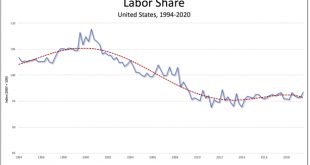from David Ruccio You know things are bad—and going to get worse—when a mainstream newspaper like the Washington Post invokes the Mohr: What Karl Marx once called “the reserve army of the unemployed” will probably keep wage growth in check as the recovery inches forward. Despite the inverted commas, Marx never used that exact phrase. He referred to an “industrial reserve army” or “relative surplus population” (in chapter 25 of volume 1 of Capital), which he saw as both a result and a...
Read More »The representative agent — a theoretical cul-de-sac
from Lars Syll Rigorous macroeconomics must therefore ground its analysis in individual behavior, recognize that only a few key variables carry over to the aggregate level, and generally posit distinct functional forms at the macro level. Keynes and Kalecki are eminent examples of this. Keynes builds his analysis of aggregate consumption on personal income and a variety of subjective and objective factors that influence individual savings (non-consumption) behavior. He is also careful to...
Read More »Trust in the future, trust as the future
from Jamie Morgan Part 3 of six part Pandemic aware economies, public health business models and (im)possible futures Whatever path is chosen it can still be pursued more or less effectively, and in an evolving world this matters for how things turn out. Governments need to project competence but they need also to translate this into actual competence; ‘demonstrated competence’ is an issue of logistics and practical procedures that follow from adequate planning at a national and local...
Read More »The case against financial de-regulation
from Asad Zaman
Read More »Crazy econometricians
from Lars Syll With a few notable exceptions, such as the planetary systems, our most beautiful and exact applications of the laws of physics are all within the entirely artificial and precisely constrained environment of the modern laboratory … Haavelmo remarks that physicists are very clever. They confine their predictions to the outcomes of their experiments. They do not try to predict the course of a rock in the mountains and trace the development of the avalanche. It is only the...
Read More »First steps into the future
from Jamie Morgan Part 2 of six part Pandemic aware economies, public health business models and (im)possible futures As we are now finding out in the UK, what happens first depends on data, treatments and vaccines. Post-lockdown societies and economies require trust in social interactions and confidence that social spaces are safe. This has always been relative, rather than absolute, but in the wealthy world the need for trust and confidence has newly been impressed on our awareness. If...
Read More »Pandemic aware economies, public health business models and (im)possible futures – Part 1
from Jamie Morgan So here we are, months into the Covid-19 pandemic and starting to feel our way through it. It is extraordinary to think that it took considerably less than a Walking Dead scenario to bring the world to a standstill. The future we now occupy has come as quite a shock. A ‘new world’ with its new language and habits of social distancing, lockdown, phased releases and perpetual background sense of dread and foreboding. A world in which friends and family are now fraternal...
Read More »From almshouses to nursing homes—pandemic edition
from David Ruccio I’ve often read that people who wash their hands in innocence do so in blood-stained basins. And their hands bear the traces.— Bertolt Brecht, Mother Courage The first time care for elderly and chronically ill Americans was radically transformed was during the first Great Depression, as almshouses were overwhelmed and public support grew to replace old-style charitable “indoor relief” with new-style government-funded “outdoor relief,” based on cash payments to people to...
Read More »The advantages and limitations of forecasting
from Lars Syll In New York State, Section 899 of the Code of Criminal Procedure provides that persons “Pretending to Forecast the Future” shall be considered disorderly under subdivision 3, Section 901 of the Code and liable to a fine of $250 and/or six months in prison. Although the law does not apply to “ecclesiastical bodies acting in good faith and without fees,” I’m not sure where that leaves econometricians and other forecasters … I came to think about this nineteenth-century New...
Read More »The misleading case for free markets
from Asad Zaman This sequence of posts goes through Charles Goodhart’s book on Evolution of Central Banking. Previous post is: RG5 Evolution of Economic Systems Chapter 2 opens with a discussion of the views of Walter Bagehot (pronounce as badge-it), author of Lombard Street, which has received a lot of recent acclaim as masterpiece on central banking. After the Global Financial Crisis, Martin Wolf asked “Doesn’t what has happened in the past few years simply suggest that [academic]...
Read More » Real-World Economics Review
Real-World Economics Review





